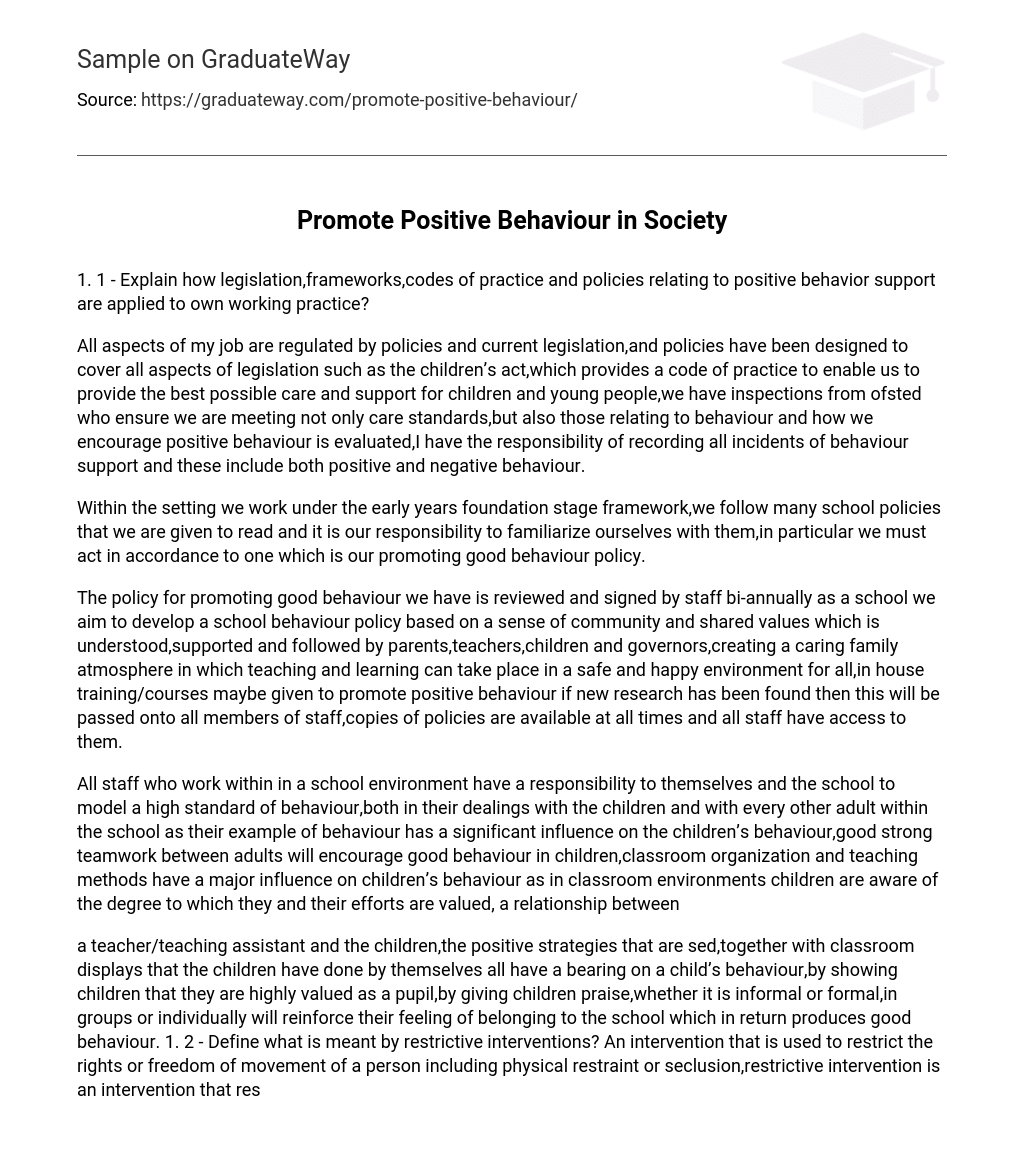Explain how legislation,frameworks,codes of practice and policies relating to positive behavior support are applied to own working practice?
All aspects of my job are regulated by policies and current legislation,and policies have been designed to cover all aspects of legislation such as the children’s act,which provides a code of practice to enable us to provide the best possible care and support for children and young people,we have inspections from ofsted who ensure we are meeting not only care standards,but also those relating to behaviour and how we encourage positive behaviour is evaluated,I have the responsibility of recording all incidents of behaviour support and these include both positive and negative behaviour.
Within the setting we work under the early years foundation stage framework,we follow many school policies that we are given to read and it is our responsibility to familiarize ourselves with them,in particular we must act in accordance to one which is our promoting good behaviour policy.
The policy for promoting good behaviour we have is reviewed and signed by staff bi-annually as a school we aim to develop a school behaviour policy based on a sense of community and shared values which is understood,supported and followed by parents,teachers,children and governors,creating a caring family atmosphere in which teaching and learning can take place in a safe and happy environment for all,in house training/courses maybe given to promote positive behaviour if new research has been found then this will be passed onto all members of staff,copies of policies are available at all times and all staff have access to them.
All staff who work within in a school environment have a responsibility to themselves and the school to model a high standard of behaviour,both in their dealings with the children and with every other adult within the school as their example of behaviour has a significant influence on the children’s behaviour,good strong teamwork between adults will encourage good behaviour in children,classroom organization and teaching methods have a major influence on children’s behaviour as in classroom environments children are aware of the degree to which they and their efforts are valued, a relationship between
a teacher/teaching assistant and the children,the positive strategies that are sed,together with classroom displays that the children have done by themselves all have a bearing on a child’s behaviour,by showing children that they are highly valued as a pupil,by giving children praise,whether it is informal or formal,in groups or individually will reinforce their feeling of belonging to the school which in return produces good behaviour.
Define what is meant by restrictive interventions?
An intervention that is used to restrict the rights or freedom of movement of a person including physical restraint or seclusion,restrictive intervention is an intervention that restricts purposeful/confrontational movement in contrast to physical intervention that involves actual bodily contact.
It may apply to containment,social restriction where, with the intervention of language it contains and restricts possibly destructive or harmful behaviour to oneself or others,placing a hand, arm, body within an instance of conflict/confrontation with the aim of diffusing & deflecting the situation without contact, use of facial expression/words that helps an individual to reassess what they are doing.
Explain when restrictive interventions may and may not be used?
When a verbal warning can be given and when the risk of injury or damage is very little,it is best not to use intervention,when the child/young person has had (and you are aware) some sort of physical,emotional abuse,has a disability or no understanding of the concept.
Explain who needs to be informed of any incidents where restrictive interventions have been used?
- Head/deputy head teacher,manager,childs keyworker,they will speak to the member of staff involved writing down and making a record of everything that is said,if there was other staff present they will be spoken too,if age appropriate the will child/young person concerned will be spoken too.
- Parents/carers will be advised of the situation as soon as possible Social services,if the child concerned is in care their social worker must be informed immediately.
- Inclusion officer/manager,the child may have a behavior management plan in place,has been involved in a number of challenging behaviour situations or is having their behavior monitored the inclusion manager must be informed so that all appropriate paperwork and records can be completed and updated to ensure the child is receiving the correct support.
School governors,the head teacher will report incidents to the governors as they have a responsibility of reviewing school policies and behaviours.
Explain the importance of reinforcing positive behaviour with individuals?
Children have a desire to please people and gain approval, if they don’t get this through the acknowledgement of positive behaviour they are more likely to use negative or challenging behaviour,by reinforcing,praising positive behaviour you are encouraging children to seek attention as a result of appropriate rather than inappropriate behaviour, by focusing on reinforcing positive behaviour you are therefore modeling the kind of behaviour you feel is appropriate because you are calm, focused and feeling positive,within the setting your team should all be showing positive behaviour towards each other as this can reflect on the children/young people.
Evaluate the impact on an individuals well being of using reactive rather than proactive strategies?
If you use proactive strategies then you can stop the behaviour before it starts. Therefore the child feels calm and relaxed and everyone is happy. If reactive strategies are used then the behaviour has already happened and the child may be experiencing remorse, be ashamed,confused, humiliated about the incident/outburst. Whereas Proactive strategies identify triggers and early indicators that help to stop the behaviour before it starts, reactive strategies deal with the behaviour once it is done. If rules or boundaries are not known then the child will not know what is expected from them.





